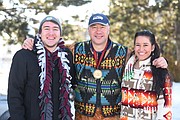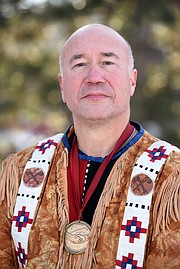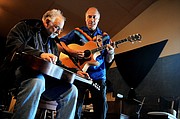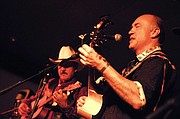'WARRIOR POET'
Before he flashes his wide, toothy smile, or greets you warmly with his bear paw of a right hand, 58-year-old Jack Gladstone, 6-foot-2 with a smoothly shaved head, looks like a fighter.
But he starts to talk and it’s about life, about love, about empathy, about warmth and about principle, and he’s the furthest thing from intimidating.
His sentences flow like a poet, unsurprisingly, with words rolling lyrically through his lips. He is calm but emphatic. Deliberate and direct. The ends of his thoughts sometimes hang an extra moment as he searches his immense vocabulary for the next, perfect word.
It’s not until somewhere around the time that he punctuates a story about his growing children by quoting Arnold Toynbee that it dawns on you: Jack Gladstone is no teddy bear. He is a ferocious fighter. And faced with a new set of challenges, he’s more determined than ever to win the battle.
BACK TO Toynbee, the early 20th century British historian.
“If there is a challenge and a society, or an individual, is incapable or unwilling to respond to that challenge adequately, appropriately, you have failure,” Gladstone said, paraphrasing Toynbee. “You have empires, you have individuals that have collapsed, that have simply gone away before their time.
“I’ll say no more.”
Talking over a quickly cooling cup of coffee following his performance at a peace rally in Whitefish last week, it’s not hard to figure what challenge Gladstone feels he is facing now.
The celebrated Blackfeet Nation musician has already been through plenty in his life, spending his earliest days in a home with his alcoholic Blackfeet father and German-American mother. Gladstone’s dad gained sobriety in 1967 — “My dad probably would have drank himself to death in the next year, year and a half,” he said — before the burgeoning young athlete found success on the football field, eventually earning a scholarship to the University of Washington where he was part of the team that won the 1978 Rose Bowl behind their superstar quarterback, Warren Moon.
Gladstone gave up football shortly thereafter, drawing closer to his Blackfeet identity along the way.
“There’s this warrior poet thing that goes into it,” Gladstone said of his time as a football player, and his relationship with a pair of teammates — Antowaine Richardson and Ronnie Rowland — who went on to form a successful pop/soul band, The Main Attraction.
Years later, after establishing himself as a distinguished performer and releasing 15 albums, Gladstone and several others would tackle another enormous challenge and work to rewrite the Blackfeet Constitution. Following nearly three years of work — Gladstone helped write the constitution’s preamble — the document is up for a vote in May.
THE “LOVE Not Hate” event Gladstone and his children, Mariah and Scott, performed at last week was a perfect fit..
“There is no military solution to a spiritual problem,” Gladstone responded to a question unrelated to the event. “And when I say spiritual I’m relating to relationship.
“The whole relationship is that we are connected as kin, as family, with something far greater than just ourselves. In a nutshell that’s it.”
Gladstone described himself as “a humanist but hopefully some sort of kinship-based humanist because we’re all related. There’s no question about that.”
He credits Lou Tice and the Pacific Institute for helping form his introspective, mindful persona. Tice, a football coach, became obsessed with cognitive psychology and the power of self-affirmation. He eventually left coaching to put those philosophies into action and founded the institute in 1971 in Seattle, right when and where a young Jack Gladstone was growing up.
“We are what we choose to become and what we affirm ourselves to be,” Gladstone said. “There’s a kind of formula there ... but we can become so much more than what we assume we can become.”
Gladstone, who was an offensive lineman on the gridiron, said he told himself “‘I am the best blocker in the NPSL, the North Puget Sound League,’” en route to being named the area’s prep Offensive Lineman of the Year.
LAST WEEK, as the hundreds in attendance listened to Gladstone speak and sing — including leading the crowd in a rousing rendition of Leonard Cohen’s “Hallelujah” — the “warrior poet” soaked in the scene.
“The purity of the will was extremely great with those in attendance,” Gladstone said. “And the message I believe it sent is that the heart is in the right place. And when the heart is in the right place, chances are the mind is not too far away.
“I am not sure they can rally that much support with Swastikas.”
Gladstone spoke afterward about the things that he discovered as a young man, working construction and singing in bars on the weekends to get by — a long way from the singer who won two prestigious awards, the First People’s Fund’s “Jennifer Easton Community Spirit Award” and the Governor’s Art Award, in 2016.
“Only through empathy was I able to transcend to a level where empathy essentially comes down to principle over politics, principle over personalities, profit, pride and prejudice. I like to remember that. ‘Try to stay on principle,’” he said.
Nearly an hour later, after a tour through his college days, his unique family history, his Blackfeet identity, the constitution he’s working on and more, Gladstone circles back to his principles. He sits up straight, smiles and says, “We can do things that will ensure our long-term survival. We can do things, also, that will flip the boat. It’s hard to get back in the boat when it’s flipped.
“Especially in oh these interesting times. ‘May you live in interesting times’ the Chinese proverb says.
“And we do. We do.”
Entertainment editor Andy Viano can be reached at 406-758-4439 or aviano@dailyinterlake.com.










